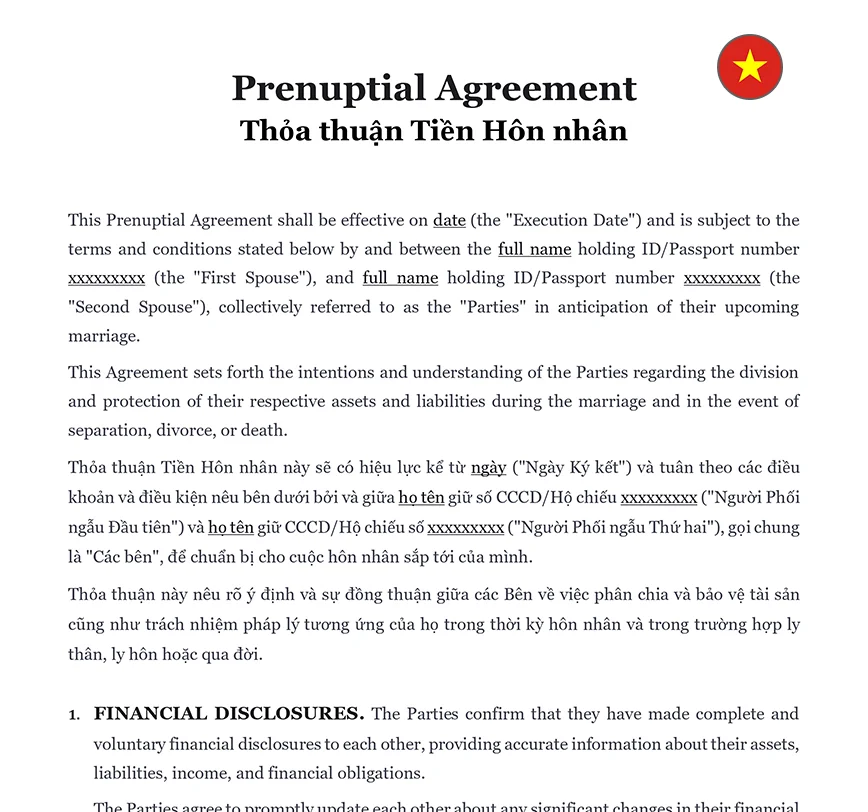Ready to use legal template
Drafted by experienced lawyers
Vietnamese-English translation
Ready to use legal template
Drafted by lawyers
Vietnamese-English translation
Home › Family law › Prenuptial Agreement
Learn more about Prenuptial Agreement in Vietnam
A Prenuptial Agreement, often referred to as a prenup, is a legal contract signed by a couple prior to marriage, delineating the division and ownership of assets, as well as potential spousal support obligations in the event of divorce or death. It serves as a proactive measure to protect the financial interests and clarify the rights of each party within the marriage. Our team of skilled lawyers has meticulously crafted a Prenuptial Agreement template that aligns with the laws and regulations of Vietnam. Delivered in an easy-to-edit Word format, our templates empower couples to personalize their agreements according to their unique circumstances and preferences. With our comprehensive and legally sound templates, you can embark on your marital journey with peace of mind, knowing that your financial arrangements are securely documented and compliant with Vietnamese law.
📄 Related documents
Table of contents
What is a Prenuptial Agreement?
What is included in a Prenuptial Agreement?
Why would someone need a Prenuptial Agreement?
How does a Prenuptial Agreement affect property division in the event of divorce?
Can it be modified or revoked after marriage in Vietnam?
Are there any limitations to what can be included in a Prenuptial Agreement?
How does it address financial matters and spousal support?
How does it protect assets and businesses in Vietnam?
What is a Prenuptial Agreement?
A Prenuptial Agreement, commonly referred to as a prenup, is a legal document that couples enter into before marriage to outline the distribution of assets and potential financial responsibilities in the event of divorce or death. It serves as a proactive measure to address financial matters and protect the interests of both parties. Prenuptial Agreements typically cover various aspects such as property, finances, debts, and other assets acquired before or during the marriage. By clearly defining each party’s rights and obligations, these agreements aim to minimize conflicts and uncertainties that may arise in the future, providing a sense of security and clarity for couples entering into marriage.
When drafting a Prenuptial Agreement, couples can customize the terms according to their specific needs and circumstances. This may include specifying how assets will be divided, determining whether spousal support will be provided, and addressing any other financial arrangements. Prenuptial Agreements are legally binding documents, subject to certain requirements and regulations, and may vary in enforceability depending on jurisdiction. It’s essential for couples to seek legal advice and ensure that the agreement complies with the laws of their respective jurisdiction. Overall, Prenuptial Agreements offer couples a proactive means of managing financial matters and protecting their interests as they embark on their marital journey.
What is included in a Prenuptial Agreement?
A Prenuptial Agreement typically includes provisions regarding the division of assets, financial responsibilities, and other matters related to finances and property. Here are some common inclusions:
1. Asset Division: This section outlines how assets, such as property, investments, and businesses, will be divided in the event of divorce or separation. It may specify which assets are considered separate property (owned individually) and which are considered marital property (owned jointly).
2. Debts: The agreement may address how debts acquired before or during the marriage will be managed and allocated between the spouses.
3. Spousal Support: Also known as alimony or spousal maintenance, this provision outlines whether one spouse will provide financial support to the other in the event of divorce or separation, and if so, the terms and duration of such support.
4. Inheritance Rights: The agreement may address whether either spouse will waive their right to inherit from the other’s estate in the event of death.
5. Business Interests: If one or both spouses own businesses, the agreement may specify how these interests will be handled in the event of divorce or separation, including valuation and ownership rights.
6. Financial Responsibilities: This section may outline each spouse’s financial obligations during the marriage, such as managing joint bank accounts, paying bills, and contributing to savings or retirement accounts.
7. Dispute Resolution: The agreement may include provisions for resolving disputes that arise regarding its interpretation or enforcement, such as through mediation or arbitration.
8. Children: While custody and child support typically cannot be predetermined in a prenuptial agreement, the document may include provisions regarding financial arrangements for any children from previous relationships or agreements about future children’s education or inheritance.
Why would someone need a Prenuptial Agreement?
There are several reasons why someone might choose to enter into a Prenuptial Agreement:
| ➤ Asset Protection: A Prenuptial Agreement can help protect assets owned by one or both parties before the marriage, ensuring that they remain separate property and are not subject to division in the event of divorce. |
| ➤ Clarifying Financial Expectations: The agreement allows couples to discuss and clarify financial expectations before marriage, including how assets will be managed, debts will be handled, and financial responsibilities will be shared during the marriage. |
| ➤ Business Interests: If one or both spouses own businesses, a Prenuptial Agreement can establish how these interests will be handled in the event of divorce, helping to protect the business from being divided or sold off. |
| ➤ Previous Marriages: Individuals who have been through divorce before may use a Prenuptial Agreement to protect assets for children from previous relationships or to clarify financial arrangements for any alimony or child support obligations. |
| ➤ Family Wealth: In families with significant wealth or assets, a Prenuptial Agreement can help protect family assets, inheritance rights, and legacy interests. |
| ➤ Unequal Financial Situations: If there is a significant disparity in wealth or earning potential between the spouses, a Prenuptial Agreement can help ensure fairness and protect the interests of both parties. |
| ➤ Clarity and Certainty: Prenuptial Agreements provide a clear framework for how financial matters will be handled in the event of divorce or death, reducing uncertainty and potential conflicts during what can be emotionally challenging times. |




